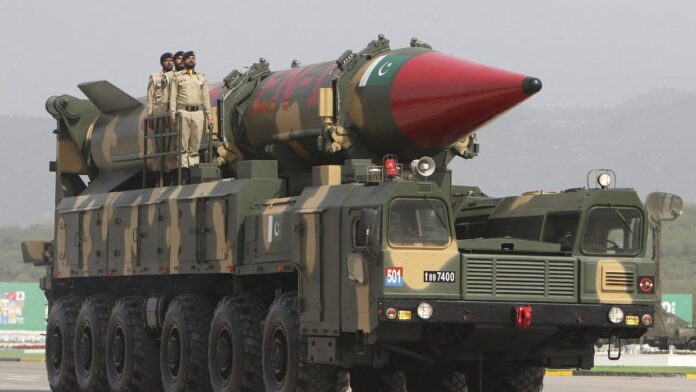
A Pakistan’s military vehicle carries a long-range ballistic missile Shaheen during the Pakistan Day parade in Islamabad on March 23, 2022.
| Photo Credit: AFP
Pakistan on Thursday (December 19, 2024) denounced new U.S. sanctions on the country’s ballistic missile program as “discriminatory” that put the region’s peace and security at risk.
Pakistan’s Foreign Ministry warned in a statement that the sanctions “have dangerous implications for strategic stability of our region and beyond.” It also cast doubt on U.S. allegations that targeted businesses were involved in weapons proliferation because previous sanctions “were based on mere doubts and suspicion without any evidence whatsoever.”

It also accused the U.S. of “double standards” for waiving licensing requirements for advanced military technology to other countries.
The sanctions freeze any U.S. property belonging to the targeted businesses and bar Americans from doing business with them.
The U.S. State Department said one such sanctioned entity, the Islamabad-based National Development Complex worked to acquire items for developing Pakistan’s long range ballistic missile program that includes the SHAHEEN series of ballistic missiles.
The other sanctioned entities are Akhtar and Sons Private Limited, Affiliates International and Rockside Enterprise.
State Department spokesman Matthew Miller posted on X platform on Wednesday that the U.S. had been “been clear and consistent about our concerns” over such weapons proliferation and that it would “continue to engage constructively with Pakistan on these issues.”
Analysts say Pakistan’s nuclear and missile program is primarily aimed at countering threats from neighboring India.
Security expert Syed Muhammad Ali called the sanctions “short sighted, destabilizing and divorced for South Asian regional strategic realities.”

Pakistan became a declared nuclear power in 1998, when it conducted underground nuclear tests in response to those carried out by its rival and neighbor India. The two sides regularly test-fired their short, medium and long-range missiles.
The two South Asian rivals have fought two of their three wars over Kashmir since gaining independence from Britain in 1947. The disputed Himalayan region is split between them and claimed by both in its entirety.
Published – December 19, 2024 04:36 pm IST
